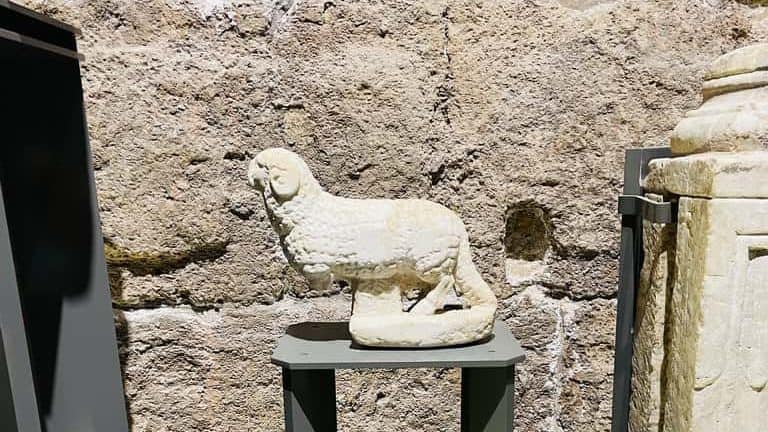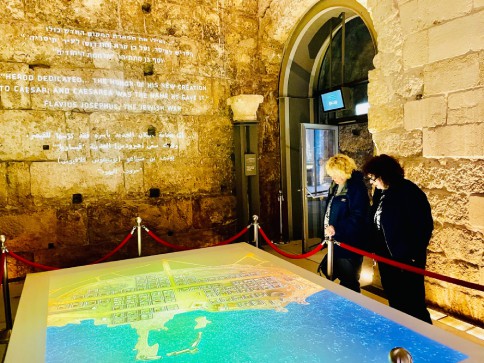Caesarea Maritima, also known as Caesarea by the Sea, holds significant historical and religious importance for Christians. Situated on the Mediterranean coast, Caesarea was a bustling Roman city during ancient times and played a notable role in the spread of Christianity. Here’s how Caesarea Maritima holds significance as a Christian center:
Saint Procopius of Scythopolis
Early Christian History:
Caesarea Maritima is associated with key events and figures from early Christian history. In Caesarea, the Roman centurion Cornelius and his household were converted by the Apostle Peter, as described in Acts 10. This event marked a significant turning point in including Gentiles in the Christian faith.
Peter’s Residence: Caesarea is believed to have been the residence of the Apostle Peter for a significant period. According to historical tradition, Peter established a community of believers in the city and conducted his apostolic work from there.
Caesarea Maritima As a Christian Center – The Imprisonment of Paul
The Apostle Paul also connected to Caesarea. In this city, he was imprisoned for a time following his arrest in Jerusalem. While in Caesarea, Paul had hearings before Roman officials, including Felix and Festus, as described in Acts 23-26.
During the Byzantine period, Caesarea Maritima continued to hold significance as a Christian center, building upon its historical roots and playing a key role in the development of Christianity in the region. Here’s how Caesarea maintained its importance as a Christian center during the Byzantine era:
Religious Infrastructure: Caesarea became a hub for Christian activity and worship during Byzantine. Churches, monasteries, and other religious buildings were constructed, marking the city as an essential Christian life center.
Caesarea Ultimate Guide

The Martyrdom of Saint Procopius:
One notable event during this period was the martyrdom of Saint Procopius in Caesarea. He was a Christian martyr who refused to renounce his faith, even in the face of persecution. His story inspired many and contributed to the growth of Christianity in the region.
The Church of St. John the Baptist:
One of the most important Christian structures in Byzantine Caesarea was the Church of St. John the Baptist. This church, built over the remains of an earlier Roman temple, became a significant pilgrimage site due to its association with John the Baptist.
The Relics of Saint Cornelius and Saint Cyprian: During the Byzantine era, the relics of Saint Cornelius and Saint Cyprian, who were Christian martyrs, were brought to Caesarea. This added to the city’s religious prestige and attracted even more pilgrims.
Decline and Arab Conquest: Despite its religious importance, Caesarea’s prominence as a Christian center began to wane towards the end of the Byzantine period. The city faced challenges, including earthquakes and changes in political control. Eventually, Caesarea was conquered by Arab forces in the 7th century, leading to a shift in its cultural and religious dynamics.
Caesarea Maritima As a Christian Center – The Library of Caesarea
During the Byzantine period, the city of Caesarea Maritima was not only a center of Christian religious activity but also boasted an impressive library that played a significant role in the intellectual and cultural life of the region. The Library of Caesarea was renowned for its extensive collection of manuscripts and its role in preserving and disseminating knowledge. Here’s more about the library at Caesarea in the Byzantine period:
Establishment of the Library: The library at Caesarea was established by the influential Christian scholar and theologian Origen (c. 185–254 AD), best known for his scholarly work on biblical texts and theological ideas. Origen founded a theological school in Caesarea, and the library was likely an integral part of this educational institution.
Extensive Collection: The Library of Caesarea was renowned for its vast collection of manuscripts and books. It housed various texts, including religious writings, philosophical treatises, scientific works, and literary compositions. The collection encompassed both Christian and non-Christian texts.
Caesarea's Visitors Center

Preservation and Copying of Texts:
The library at Caesarea played a crucial role in preserving and copying manuscripts. Origen was known for his textual scholarship and efforts to produce accurate versions of biblical texts. The library’s scribes were likely involved in copying and preserving these texts for future generations.
Cultural Exchange and Influence: The library’s extensive collection attracted scholars, students, and intellectuals from various regions. Caesarea’s strategic location along trade routes facilitated the exchange of ideas and knowledge between different cultures, making it a hub of cultural diversity and intellectual exchange.
Legacy and Influence: The Library of Caesarea contributed to the intellectual and theological development of early Christianity. It gave scholars access to a diverse range of texts and shaped theological discussions and debates of the time.







